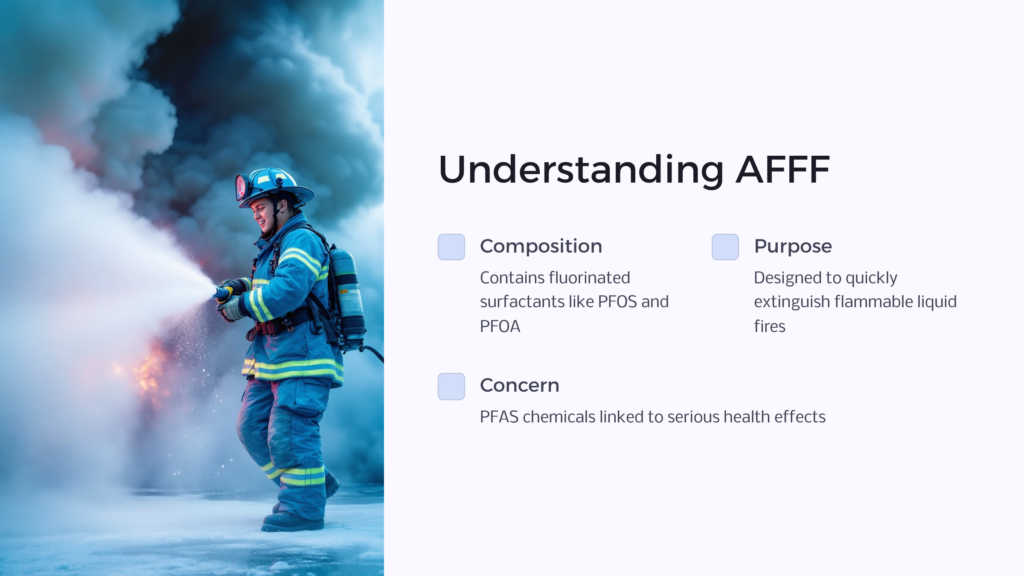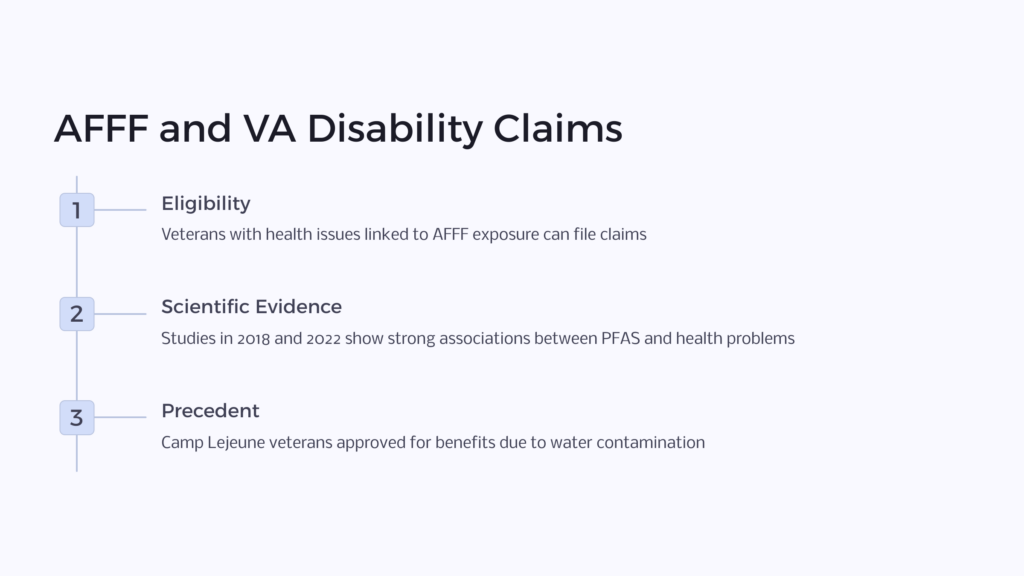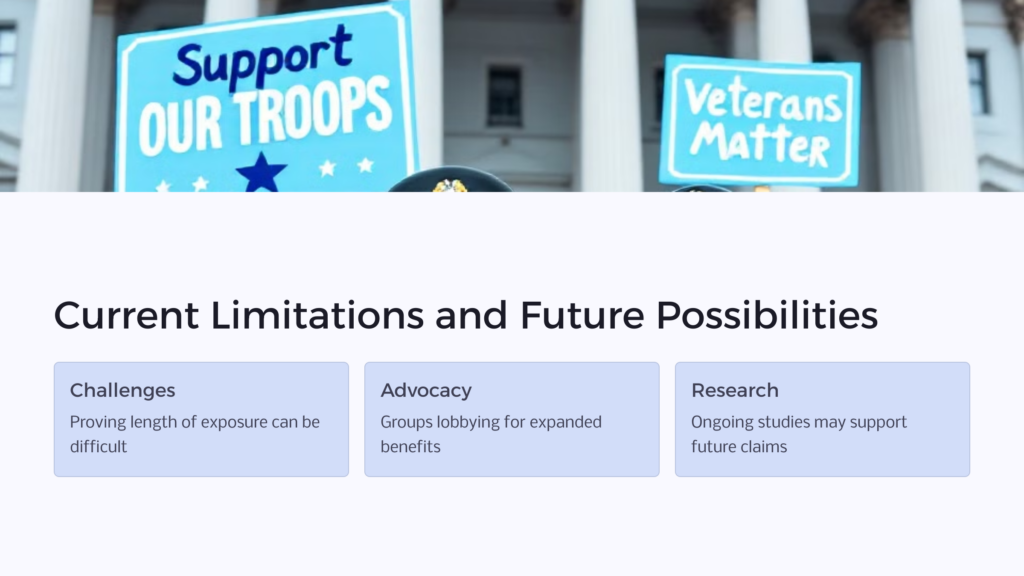Aqueous Film Forming Foam (AFFF) is a firefighting foam that has been used extensively by the military and civilian firefighters for decades. However, there is growing evidence that exposure to AFFF can cause serious health effects. As a result, firefighters and others are increasingly filing disability claims—for veterans who were exposed during service, you can file with the Department of Veterans Affairs (VA). This article provides an overview of AFFF, how exposure occurs, the health impacts, and how to file an exposure-related VA claim.
What is AFFF?

AFFF is a type of firefighting foam that was first developed in the 1960s by the U.S. Navy. It was designed to quickly extinguish flammable liquid fires, especially fuel fires. AFFF works by forming an aqueous film that spreads across the surface of hydrocarbon fuels that prevents them from reigniting.
Modern AFFF formulations also contain fluorinated surfactants such as perfluorooctane sulfonate (PFOS) and perfluorooctanoic acid (PFOA). These chemicals give AFFF its fire-extinguishing properties. However, PFOS, PFOA, and related per- and polyfluoroalkyl substances (PFAS) are also linked to serious health effects in humans and animals.
Exposure Pathways
Firefighters, military personnel, aviation workers, and other emergency responders who have used or been trained to use AFFF may have had direct skin contact with the foam. Clean-up workers may have also had direct contact during remediation of AFFF spills and accidents.
However, research shows that simple proximity to AFFF use can also lead to exposure even if there is no direct contact. PFAS chemicals migrate through soil to groundwater supplies and also spread through the air as a fine mist during fire training or emergency response incidents.
Over decades of widespread use at military sites and civilian airports across the country, PFAS contamination of drinking water has become a national-scale problem. Veterans and civilians living or working on or near locations where AFFF was regularly used may have unknowingly ingested PFAS through contaminated drinking water on the base.
Health Effects
Exposure to PFAS chemicals is linked to serious negative health outcomes in humans and animals:
Short-Term Effects
- Skin and eye irritation upon direct contact
- Nausea, vomiting, diarrhea after ingestion
Long-Term Effects
- Increased risk of certain cancers such as kidney, testicular, and bladder cancer
- Liver damage
- High cholesterol
- Thyroid disease
- Immune system effects
- Reproductive issues including infertility and low birth weight
The health effects can take months or years to manifest but are lasting due to the persistence of the chemicals in the body and environment.
The Link between AFFF and VA Disability Claims

Veterans who have experienced health issues connected to AFFF exposure can file claims for disability compensation with the U.S. Department of Veterans Affairs (VA). By law, the VA provides disability benefits to veterans with injuries or illnesses that occurred or were aggravated during active military service.
Several major studies have found evidence linking PFAS exposure to serious health conditions that would qualify a veteran for disability compensation:
- A study in 2018 on PFAS exposure and its effects on health showed that while we need more studies to be done on AFFF and other PFAS exposure, associations between exposure and health problems are strong. High exposure can be linked to cancer, and many effects are manifested in children.
- Another study in 2022 found that AFFF exposure leads to cellular toxicity and decreased cell proliferation, even in lower concentrations.
There are also documented cases of VA disability claims being approved due to AFFF exposure:
- After finally confirming PFAS contamination of groundwater, the Marine Corps Base Camp Lejeune in North Carolina began notifying veterans who had lived and worked at the base between 1953 and 1987. As a result, veterans who have suffered from AFFF-related health issues like cancer have started to be approved for VA disability benefits.
How to File an AFFF-Related VA Claim
Veterans seeking compensation for health conditions caused by exposure to hazardous chemicals and materials, like AFFF should take the following steps:
Step 1) Determine if your current health conditions match those scientifically linked to PFAS exposure. Collect documentation of your medical diagnoses.
Step 2) Gather evidence showing you worked with or were exposed to AFFF during your time in service. Service records detailing your occupations and duties may be requested from the VA or your branch of service. Additionally, buddy statements from fellow servicemembers confirming AFFF exposure can support your claim.
For those exposed via drinking water contamination, identify the military base, unit, dates, and length of time you lived on base during the documented contamination period.
Step 3) Submit the VA claim form detailing when, where, and how you were exposed to AFFF, linking this exposure to your current medical conditions. Attach all relevant medical records and exposure evidence.
Step 4) You may request assistance from a veteran’s service representative to help compile documentation and navigate the claims process.
Step 5) After submitting the claim, the VA will review the evidence and schedule a medical exam by a VA doctor to evaluate your disabilities before making a final claims decision.
The entire claims and appeals process can take over a year in complex exposure cases. Having an experienced representative is key, as initial claims are often denied and must proceed through the appeal process.
Current Limitations and Future Possibilities

The VA only recently recognized the harm caused by PFAS exposure, so linking conditions to AFFF can still be challenging for veterans. While some types of claims are now possible, current restrictions around contaminated drinking water claims present difficulties in proving the length of exposure.
However, veteran advocacy groups are lobbying Congress to pass legislation that would provide health care and disability benefits to all veterans exposed to water contamination. Additionally, a centralized PFAS exposure registry could streamline future disability claims.
Continuing research and more state action banning PFAS could also pave the way for more federal support programs for veterans, firefighters, and others affected by AFFF exposure.
AFFF has provided critical fire protection capabilities to our military. However, we now know this came at a great cost to the health of veterans and surrounding communities. Only by thoroughly studying contamination sites, responsibly restricting further AFFF use, and providing health care support to those already affected can we mitigate the damage.
Veterans experiencing health issues possibly related to AFFF exposure should consult their doctors, seek out veterans groups assisting with exposure-related claims, and file claims for VA disability compensation if eligible. Collectively raising awareness about this issue can also help bring about policy changes to better protect current and future servicemembers.
 Benefits.com Advisors
Benefits.com Advisors
With expertise spanning local, state, and federal benefit programs, our team is dedicated to guiding individuals towards the perfect program tailored to their unique circumstances.
Rise to the top with Peak Benefits!
Join our Peak Benefits Newsletter for the latest news, resources, and offers on all things government benefits.



















